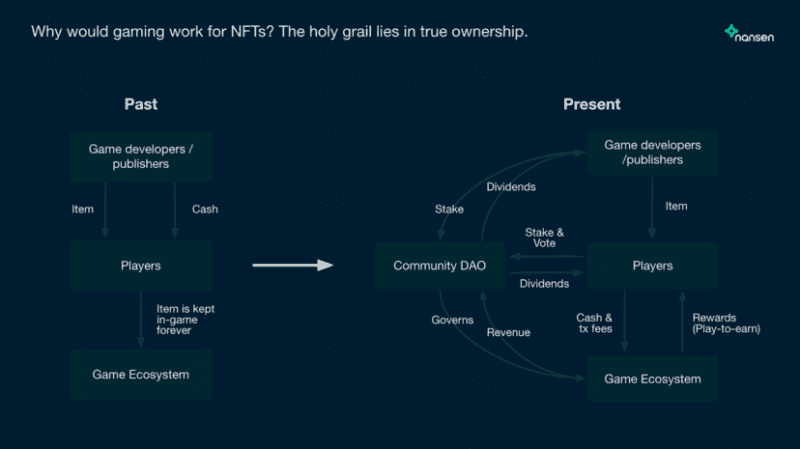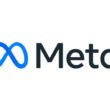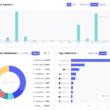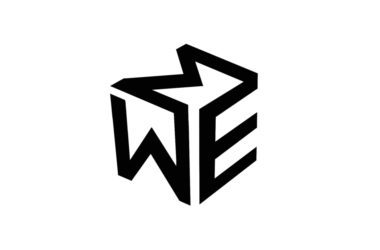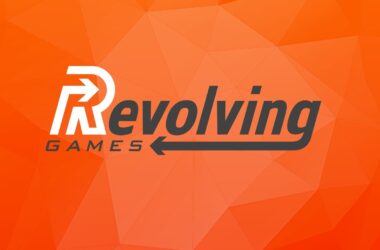Quick take:
- A new report by DeFiance Capital envisions the future of the gaming industry.
- The report identifies the weaknesses and strengths of current web3 games and what can be done to make them better.
- According to DeFiance Capital founder Arthur Cheong, a plat-to-own gaming mechanism could help onboard mainstream gamers to web3.
The future of web3 gaming lies in a new economic model called “play-to-own” (P2O), a new report by DeFiance Capital founder Arthur Cheong has declared. According to Cheong and his two co-authors, Bailey and David, the current play-to-earn model could never onboard masses to the blockchain because of its inflationary earning mechanism.
The three co-authors define a play-to-own game as “a blockchain-enabled game developed with the ethos of Web3 — which is incentive alignment and true stakeholder ownership. Players are rewarded for their play and contributions with ownership of the game in the form of tokens or in-game assets.”
Unlike the play-to-earn games which focus on maximising players’ profits, a play-to-own model would be focusing on building fun games.
One of the biggest obstacles to onboarding mainstream gamers to web3 is the poor quality of games in the market. Some blockchain game developers have prioritised adding multiple earning mechanisms at the expense of improving the quality of games they build.
Play-to-earn games attract the wrong types of players incapable of building a sustainable community. Arthur and co believe that a lot of people joining play to earn games are interested in making profits. And as such, once the game can no longer sustainably continue making them money, they tend to pull out leaving a skeleton of a community.
This is one of the reasons why most in-game tokens tend to experience high volatility as their prices plummet the moment these profit-driven investors cash out their staked tokens.
It is why play-to-own must focus on onboarding real gamers from the mainstream, rather than fishing within the crypto space.
For this model to work though, DeFiance Capital thinks the games must be built better, to rival their web2 counterparts.
“Games are not jobs and should not emphasize the ability to earn money from playing. This terminology reflects the need to align both players and owners of a game as well as an understanding of NFT technology, which are all about improved ownership,” the authors wrote.
Play-to-own will bring about a strong sense of in-game assets and IP ownership, which will be key to establishing a sustainable economy.
“We believe this model will allow games to reap the real benefits of blockchains such as unlocking value from in-game assets, better price discovery and building a strong sense of community ownership.”
Essentially, by onboarding real gamers, web3 games will be building communities that are more interested in claiming ownership rather than computing how much profit they can make by cashing out their in-game assets.
While play-to-earn games solved a problem of revenue sharing that plagued gaming for decades, they also created another, an economy that benefits early adopters at the expense of late entrants.
Using Axie Infinity as a reference point, the pioneer NFT game inspired the emergence of several play-to-own games that got into the business purely to chase profits.
But as DeFiance points out: “Most have struggled with overly high inflation of their in-game currency due to poor economic design and management — a high percentage of players cashing out causes a death spiral whereas token prices drop, earnings of players drop, and they stop playing the game because their main reason for playing is to earn financial yield.”
However, not everything the P2E model brought is detrimental. The concept has already established a strong foundation for building play-to-own games.
“The open and trustless economy built on the blockchain enables a vibrant secondary market for game assets,” the authors write, adding that prices are controlled by the market forces of demand and supply as compared to the traditional gaming economy where developers hold all the cards.
Stay up to date:
